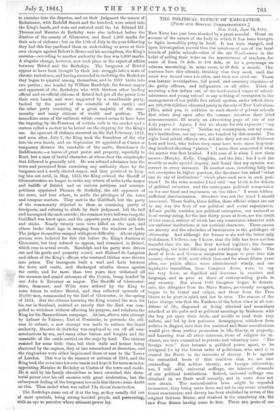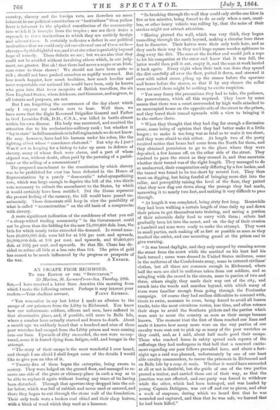THE POLITICAL EFFECT OF EMIGRATION.
[FROM OUR SPECIAL CORRESPONDEMA
New York, June 18, 1804. NEW YORK has just been shocked by a great scandal. Great on account of the nature of the body in which it has been brought to light, incredibly petty in itself. It has been charged, and. upon investigation proved that the members of one of the local boards of public schools—that of the 4th Ward—were in the habit of selling their votes on the appointment of teachers, for sums of from 75 dole. to 100 dols., or for a percentage on salaries amounting, in some cases, to 20 dols, a month. The teachers bore this silently, thinking that they must, until the screw was turned once too often, and then one cried out. There was instant investigation, full proof, and summary expulsion of the guilty officers, and indignation on all sides. Think of screwing a few dollars out of the hard-earned wages of school- mistresses and young tutors to say nothing of corruption in the management of our public free school system, under which there are 200,000 children educated yearly in the city of New York alone. (This, mind you, in addition to such shoals of private schools that when they open after the summer vacation their brief announcements fill nearly an advertising page of one of our &lily papers.) Again, I feel no shame for this exposure : "my withers are unwrung." Neither my countrymen, nor my coun- try's institutions, nor my race, are touched by this scandal. The eight local school officers who did this dirty act are all Irishmen born and bred, who before they came here were mere bog-trot- ting landlord-shooting "'mishits." I more than suspected it when the matter was first bruited. I felt sure of it when I saw their names—Murphy, Kelly, Coughlin, and the like; but I took the trouble to make special inquiry, and found that my opinion was correct in every instance. Ph another case, involving folly but not corruption in higher quarters, the Spectator has asked "what can we say of institutions" which place such men in such posi- tions ? In the same number I had said "my blush is for defects of political structure, and the consequent political compositior on the one hand and supineness on the other." I wrote withon sufficient discrimination. Structure was not the word I should have used. These faults, these follies, these official crimes are not in any way the fruit of our political and social organization. All our public troubles, our political corruption, our national or local wrong-doing, for the last thirty years at least, are the result of two causes, neither of which has any connection whatever with our national institutions or our national character. These causes are slavery and the admission of immigrants to the privileges of citizenship. And although the former is sin and the latter only foolishness, I believe, nay I know, that the folly has been not leas harmful than the sin. But they worked together ; the former corrupting, the latter diffusing and establishing the taint. The flood of Irish and German emigration began to pour into this country about 1816, until which time and for about fifteen years after, our public affairs were administered wisely, and our legislative assemblies, from Congress down, were, to say the very least, as dignified and decorous in conduct and language, and as pure as those of corresponding grade in any country. But about 1830 Congress began 'to deterio- rate, the delegates from the Slave States, previously arrogant, began to be brutal and vulgar, and those from the Free States to be poor in spirit and low in tone. The reason of the latter change was that the Yankees of the hetter class in all con- ditions of life, disgusted at being elbowed and sometimes attacked at the polls and at political meetings by Irishmen with the bog -yet upon their heels, and unable to read their very ballots, and led by low pothouse demagogues, withdrew from politics in disgust, sure that time national and State constitutions would give them perfect protection in life, liberty, or property, and knowing that all other interests, those of religion for in- stance, are here committed to private and voluntary care. "The foreign vote" thus became a political power apart, to be intrigued for by the lowest order of politicians, who used it to control the North in the interests of slavery. It is against the embattled hosts of that coalition that we are now
contending. But neither slavery, nor foreign citizenship, nor, I will add, universal suffrage, are inherent elements of our political institutions. Indeed, universal suffrage was obtained in no State until recently, and in some does not now obtain. The naturalization laws might be repealed to-morrow, they being mere lawo, and not in any sense constitu tonal enactments; and slavery has been abolished in seven of the original thirteen States, and retained in the remaining six, the new Free States having come in free. These two pests of our country, slavery and the foreign vote, are therefore no more inherent in our political constitution or "institutions" then yellow fever is inherent in the physical constitution of the community into which it is brought from the tropics ; nor are their fruits a reproach to tho-le institutions to which they are entirely foreign and adventitious. It certainly indicates a defect in our political institutions that we could only rid ourselves of one of these evils- slavery—by thisfrielitful war,and that the other is probably beyond hope of remedy. Those defects we see ; but we see also that they could not be avoided without involving others which, in our judg- ment, are greater. But oh ! that there had never a negro or an Irish- man come to these shores ! We should not have been quite so rich ; should not have pushed ourselves so rapidly westward. But bow much happier, how much healthier, how much lovelier and more respectable our national life would have been, only he knows who goes into that terra incognita of British travellers, the six New England States, where Irishmen, and Germans, and negroes, to all intents and purposes, are not.
But I am forgetting the occurrences of the day about which only I suppose my readers care to hear. Well then, we have news that the Right Reverend Brigadier General and Father in God. Leonidas Polk, D.D., C.S.A., was killed in battle almost within his own diocese. His body was recovered, and received the attention due to his ecclesiastico-military rank ; but whether it "lay in state'. in full canonicals or in full regimentals we do not know. He may, however, have had his harness under his robes, like the fighting abbot whose " conscience clattered." But why do I jeer? Was it not in keeping for a bishop to take up arms in defence of slavery, many of whose flock were slaves, and a part of whose stipend was, without doubt, often paid by the pawning of a parish- ioner or the selling of a communicant?
The proposed amendment to the constitution by which slavery was to be prohibited for ever has been defeated in the House of Representatives by a purely " democratic " rebel-sympathizing vote, which was large enough to deprive the bill of the two-thirds vote necessary to submit the amendment to the States, by which it would certainly have been rectified. Did the House represent the present feeling of the country, the bill would have passed un- animously. 'these democrats still keep in view the possibility of what is called " reconstruction " on the old basis of a compromise with slavery.
A more significant indication of the confidence of what you call " a sharp-witted trading community" in the Government could not be given than the bidding for the new 75,000,000 dols. loan, the bids for which nearly twice exceeded the demand. In round num- bers 20,000,000 dols. were bid for at 105 per cent. and upwards, 50,000,000 dols. at 104 per cent. and upwards, and 60,000,000 dols. at 103i per cent, and upwards. So that Mr. Chase has de- cided to refuse all bids at a less rate than 104. The price of gold has ceased to be much influenced by the progress or prospects of































 Previous page
Previous page